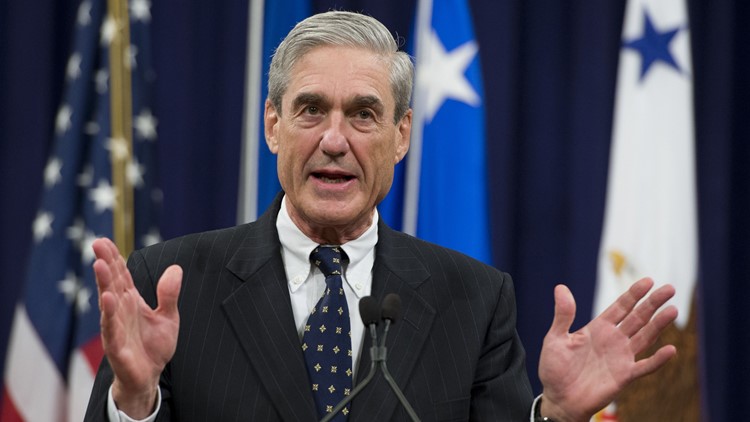The Justice Department tapped former FBI director Robert Mueller to be a special counsel overseeing the Russia investigation, the department announced Wednesday.
The news comes as President Trump and his administration grapple with the fallout from explosive revelations earlier this week that now-fired FBI director James Comey kept notes of a February meeting indicating Trump asked him to close the agency's investigation into former National Security Adviser Michael Flynn.
The memo, on the heels of Trump's abrupt firing of Comey last week, fueled accusations by lawmakers of possible obstruction of justice – and calls for an independent prosecutor to oversee the FBI's ongoing counterintelligence probe into possible collusion between Trump campaign associates and Russia during the presidential campaign.
"I determined that it is on the public interest for me to exercise my authority and appoint a special counsel to assume responsibility for this matter," Deputy Attorney General Rod Rosenstein said Wednesday. "My decision is not a finding that crimes have been committed or that any prosecution is warranted."
Based on the "unique circumstances," Rosenstein said, "the public interest requires me to place this investigation under the authority of a person who exercises a degree of independence from the normal chain of command."
Mueller served as FBI director from 2001 to 2013 under both the George W. Bush and Obama administrations.
Mueller, who preceded Comey as FBI director, was the longest serving director since J. Edgar Hoover. He served two additional years beyond his 10-year term, to ensure stability during a transition period in President Obama's national security team.
In his special counsel role, Mueller assumes all the powers of a federal prosecutor – including subpoena authority.
"I have determined that a special counsel is necessary in order for the American people to have full confidence in the outcome," Rosenstein said. "Our nation is grounded on the rule of law and the public must be assured that government officials administer the law fairly. Special Counsel Mueller will have all appropriate resources to conduct a thorough and complete investigation, and I am confident that he will follow the facts, apply the law and reach a just result."
The authority to appoint a special counsel fell to Rosenstein, after Attorney General Jeff Sessions recused himself from the Russia case because of his pre-election contacts with Russian ambassador Sergey Kislyak, which Sessions did not disclose during his Senate confirmation hearing.
Mueller, who joined law firm WilmerHale in 2014, will resign to avoid any conflicts of interest with firm clients or attorneys, the Justice Department said.
The White House offered no immediate comment. Administration officials there could be seen racing in and out of West Wing offices, formulating a response to the new development.
White House officials such press secretary Sean Spicer had said as recently as Tuesday there was no need for a special counsel.
Yet key Republicans lawmakers immediately welcomed the announcement. "Mueller is a great selection. Impeccable credentials. Should be widely accepted," tweeted Rep. Jason Chaffetz, R-Utah, chair of the powerful House Oversight and Government Reform committee.
Mueller is a great selection. Impeccable credentials. Should be widely accepted.
— Jason Chaffetz (@jasoninthehouse) May 17, 2017
Democratic senators also welcomed the news. Sen. Tim Kaine, D-Va., who was Hillary Clinton's running mate in last November's presidential election, called the announcement "a good move."
"Now let's get some answers," he tweeted.
Sen. Dianne Feinstein, D-Calif., the top Democrat on the Senate Judiciary Committee, called the appointment "a good first step."
"Bob was a fine U.S. attorney, a great FBI director and there’s no better person who could be asked to perform this function," she said in a statement. "He is respected, he is talented and he has the knowledge and ability to do the right thing."
Mike McKay, the former U.S. Attorney in the Western District of Washington, says Mueller is a superb choice for the new role.
"His integrity far surpasses whatever political inclinations he would have. His foremost intent will be to do what is best for our country," said McKay.
Both the House and Senate Intelligence Committees are conducting their own investigations into Russia's interference in the presidential election. The intelligence community has accused Moscow of orchestrating a campaign of cyberattacks against Democratic political organizations during the elections, and leaking them to websites such as WikiLeaks with the goal of undermining Hillary Clinton's campaign and public confidence in the democratic process.
Mueller's appointment, the Justice Department said Wednesday, was made through the special counsel statute. It was exercised only once before, in 1999, when then-Attorney General Janet Reno appointed Former Missouri Sen. Jack Danforth investigation into FBI handling of government raid on Branch Davidian compound at Waco, Texas.
Under provisions of the special counsel statute, Rosenstein still maintains some oversight authority in the investigation. But any decision to overrule the appointed counsel requires notification to the chairs of the House and Senate Judiciary committees.
Rosenstein is scheduled to brief senators on Thursday about the decision to fire former FBI director James Comey. Sen. Bob Corker, R-Tenn., chairman of the Foreign Relations Committee, said he was now looking forward to hearing about Rosenstein's decision to appoint a special counsel.
Not all lawmakers say they necessarily saw a need for a special counsel. "I think probably the hysteria was building up and they figured they'd calm it down send some raw meat to the wolf pack," Rep. Peter King, R- N.Y., former Homeland Security Committee chairman, told reporters about the reasoning for selecting one. "If there's gonna be one there's gonna be one, doesn't matter to me but I don't see a need for it."
On the other hand, some Democrats indicated Mueller's appointment might not be enough. "I respected him as FBI director. I think he did a great job," said Rep. Jim Clyburn, D-S.C. "I think people are beginning to understand that this is bigger than Trump – this is about the country."
Still, Clyburn said he hoped Congress would appoint a separate panel to take on the Russia inquiry. "To me this does not negate a 9/11-type commission," Clyburn said.
Rep. Joaquin Castro, D-Texas, said Democrats would go forward with a bill to create an independent commission. "I think there’s a usefulness for both," he said. "The independent commission is useful for purposes of investigation, a special prosecutor obviously considers whether any crimes were committed. So although their work will, obviously, overlap, they also perform different functions."
The House earlier Wednesday rejected an attempt by Democrats to force a vote on creating an independent commission to investigate Russian interference in the 2016 election.
The legislation would create a 12-member, bipartisan commission that could interview witnesses, obtain documents, issue subpoenas and receive public testimony to investigate Russia’s attempts to influence the election.
"Director Mueller will still be in the chain of command under the Trump-appointed leadership of the Justice Department," said House Minority Leader Nancy Pelosi, D-Calif. "He cannot take the place of a truly independent, outside commission that is completely free from the Trump administration’s meddling."
Pelosi continued, "The question also remains: will Mueller’s investigation include President Trump’s attempt to intervene in the investigation of Michael Flynn? The American people have a right to the truth, free from the Trump Justice Department’s efforts to silence it."
As he begins overseeing the wide-ranging Russia inquiry, Mueller ultimately will have to determine whether his successor, the recently dismissed Comey, could be needed as a witness.
Aside from their roles as former FBI directors, Mueller also shares another special connection with Comey.
In 2004, Comey, then deputy attorney general, and FBI director Mueller rushed to the hospital room of ailing Attorney General John Ashcroft to head off White House Counsel Alberto Gonzales and White House Chief of Staff Andrew Card who sought Ashcroft’s approval for the renewal of the controversial warrantless wiretap program. When Mueller and Comey threatened to resign, the White House relented.
Meanwhile, members on Capitol Hill pledged to continue their own investigations into possible Trump campaign ties to Russia.
Rep. Mike Conaway, R-Tx., who is heading the House Intelligence Committee's investigation into the matter, said he was not given a heads up before the appointment, but he still expected his investigation to move forward as planned.
"I don't think it will have an effect," Conaway told reporters. "The importance of our investigation, I don't think is diminished in the least."
Rep. Elijah Cummings, D-Md., ranking member of the House Oversight Committee, said his panel's investigation would continue but he was happy there was an outside investigator in addition.
"Clearly, all these investigations will overlap, but the one that Mr. Mueller will be overseeing, I think, will probably have the most significance in a lot of ways,” Cummings said, citing “full-weight of the federal government and the justice department.” Mueller’s investigation, he added, would have more resources than the congressional committees.
Contributing: Herb Jackson, David Jackson, Jessica Estepa, Eliza Collins, Erin Kelly



